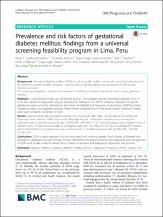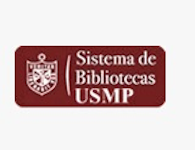Mostrar el registro sencillo del ítem
Prevalence and risk factors of gestational diabetes mellitus: findings from a universal screening feasibility program in Lima, Peru
| dc.contributor.author | Larrabure-Torrealva, Gloria T. | |
| dc.contributor.author | Martinez, Stephanie | |
| dc.contributor.author | Luque-Fernandez, Miguel Angel | |
| dc.contributor.author | Sanchez, Sixto E. | |
| dc.contributor.author | Mascaro, Pedro A. | |
| dc.contributor.author | Ingar, Hugo | |
| dc.contributor.author | Castillo, Walter | |
| dc.contributor.author | Zumaeta, Rina | |
| dc.contributor.author | Grande, Mirtha | |
| dc.contributor.author | Motta, Vicky | |
| dc.contributor.author | Pacora, Percy | |
| dc.contributor.author | Gelaye, Bizu | |
| dc.contributor.author | Williams, Michelle A. | |
| dc.date.accessioned | 2020-06-25T18:07:11Z | |
| dc.date.available | 2020-06-25T18:07:11Z | |
| dc.date.issued | 2018-07-18 | |
| dc.identifier.citation | Larrabure GT., Martinez, S., Luque MA., Sanchez SE., Mascaro PA., Ingar H., et al. Prevalence and risk factors of gestational diabetes mellitus: findings from a universal screening feasibility program in Lima, Peru. BMC Pregnancy Childbirth. 2018; 18: 303 | es_PE |
| dc.identifier.uri | https://hdl.handle.net/20.500.12727/6263 | |
| dc.description.abstract | Background Gestational diabetes mellitus (GDM) is a global public health concern with potential implications for the health of a mother and her offspring. However, data on the prevalence and risk factors of GDM in Latin America are scarce. The study was designed to estimate the prevalence of GDM and identify maternal risk factors among Peruvian women. Methods A cross-sectional study was conducted among 1300 pregnant women attending a prenatal clinic in Lima, Peru. GDM was diagnosed using an Oral Glucose Tolerance Test (OGTT) performed between 24 and 28 gestational weeks using the International Association of Diabetes and Pregnancy Study Groups (IADPSG) criteria. Depression status was assessed using the Patient Health Questionnaire-9. Multivariate logistic regression models were used to identify risk factors of GDM. Results Approximately 16% of pregnant women were diagnosed with GDM. The prevalence of obesity and depression were 24.4 and 10.6%, respectively. After adjusting for confounders, mid-pregnancy obesity was associated with a 1.64-fold increased odds of GDM (OR: 1.64; 95% CI: 1.03–2.61). Participants with a family history of diabetes had a 1.5-fold increased odds of developing GDM (OR: 1.51, 95% CI: 1.10–2.07) as compared to women without this family history. Depression was associated with a 1.54-fold increased odds of GDM (OR: 1.54; 95% CI:1.09–2.17). Conclusions GDM is highly prevalent and was associated with maternal obesity, family history of diabetes and antepartum depression among Peruvian women. Intervention programs aimed at early diagnoses and management of GDM need to take maternal obesity, family history of diabetes and antepartum depression into account. | es_PE |
| dc.description.sponsorship | Roche Diagnostic Operations Inc., proyecto número 208617-5074547 y el Instituto Nacional de Salud de las Minorías y Disparidades de salud, Institutos Nacionales de Salud (T37-MD0014490). | es_PE |
| dc.format.extent | pp. 303 | es_PE |
| dc.language.iso | eng | es_PE |
| dc.publisher | Springer Nature | es_PE |
| dc.relation.ispartof | urn:issn:0719-2479 | |
| dc.relation.ispartofseries | BMC Pregnancy and Childbirth;vol. 18 | |
| dc.relation.uri | https://doi.org/10.1186/s12884-018-1904-0 | es_PE |
| dc.rights | info:eu-repo/semantics/openAccess | es_PE |
| dc.rights.uri | https://creativecommons.org/licenses/by/4.0/ | es_PE |
| dc.source | Repositorio Académico USMP | es_PE |
| dc.source | Universidad San Martín de Porres - USMP | es_PE |
| dc.subject | Diabetes mellitus | es_PE |
| dc.subject | Diabetes gestacional | es_PE |
| dc.subject | Obesidad | es_PE |
| dc.subject | Depresión | es_PE |
| dc.subject | Embarazo | es_PE |
| dc.subject | Perú | es_PE |
| dc.title | Prevalence and risk factors of gestational diabetes mellitus: findings from a universal screening feasibility program in Lima, Peru | |
| dc.type | info:eu-repo/semantics/article | es_PE |
| thesis.degree.name | Medicina Humana | es_PE |
| thesis.degree.grantor | Universidad de San Martín de Porres. Facultad de Medicina Humana | es_PE |
| thesis.degree.discipline | Medicina | es_PE |
| dc.subject.ocde | https://purl.org/pe-repo/ocde/ford#3.02.00 | es_PE |
Ficheros en el ítem
Este ítem aparece en la(s) siguiente(s) colección(es)
-
Artículos [274]








